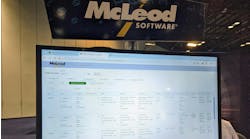A special federal advisory committee has answered the question: What's more important for turning entry-level drivers into professional drivers - logging hours behind the wheel or performance-based training?
Their answer: hours behind the wheel.
At their last meeting of a series on May 29, the 26-member group of commercial vehicle stakeholders voted 24-2 to recommend to the Federal Motor Carrier Safety Administration that entry level truck drivers be required to log at least 30 hours of behind the wheel. They also recommended that learners spend at least 10 hours of those hours on the road and 10 hours on a range. The remaining time would be divied up between road and range.
Jim Edwards, Washington Representative for the National Association of Small Trucking Companies, was one of two votes for performance-based training instead of hours training. The other vote came from Boyd Stephenson, director of hazardous material policy for the American Trucking Associations. According to Edwards, the committee was almost evenly split between hours based and performance based until the final vote. "The reason why my group, NASTC, prefers performance-based training is because some people will get it quicker and others more slowly. The hours don't matter as much as whether or not a driver can perform maneuvers, backing and other skills that they need to drive safely."
He also notes that those who are in favor of hours based often believe that more hours are better so that means whatever number is agreed upon now could be increased incrementally over time. "If it's 30 hours now, it could be 50 hours in later years. More hours are always better to that mindset. At a certain point these increased hours will add costs to carriers, shippers, brokers and others." He adds: "It seems to me that what we really want from drivers is performance on the job, so why not stick with performance-based training?"
The FMCSA is not under any obligation to accept the committee's recommendations, but Edwards is inclined to think that they will. He says that the committee followed the instructions set forth in the proposed negotiated rulemaking and FMCSA put a lot of resources into the process. He also says that FMCSA will most likely accept the recommendations, place them into the proposed rulemaking and make any changes, if warranted, after public comments.
The committee also recommended that FMCSA establish a national registry of driver trainers along the same lines that the administration has already set up for medical examiners.
In another matter, the committee also took up the issue of whether or not a driver who has let his CDL lapse should have to take a refresher course. The group recommended that FMCSA not require a driver with a good driving record to take any refresher courses before taking the CDL test again.
For the committee's recommendations to be accepted by the Office of Management and Budget it must pass a cost-benefit analysis test proving that the safety benefits of entry-level training rules are cost effective. In other words, that they are worth the money and time spent on implementation and operation.


